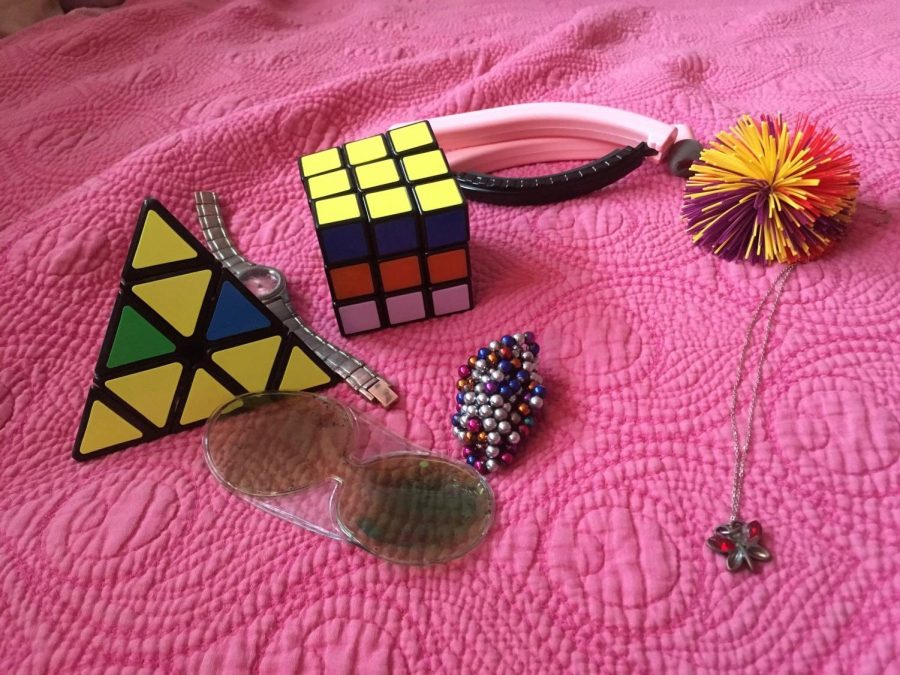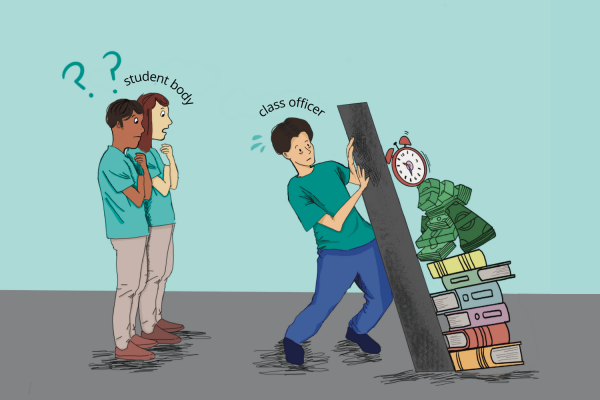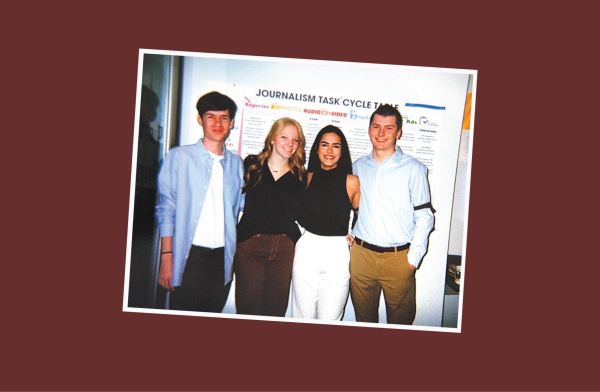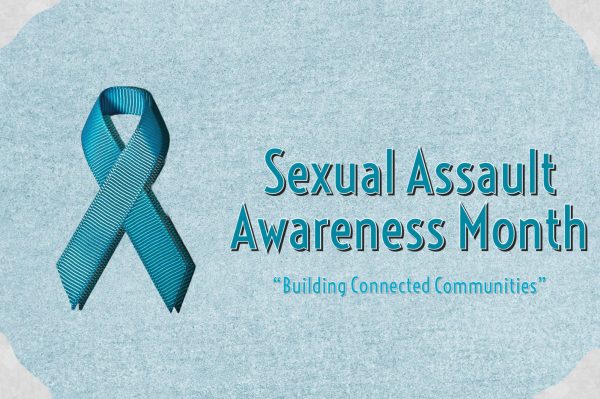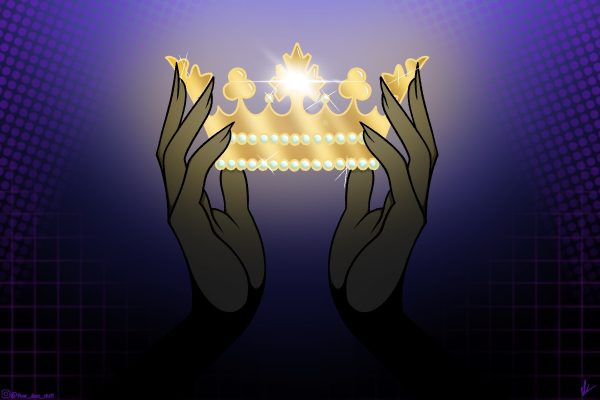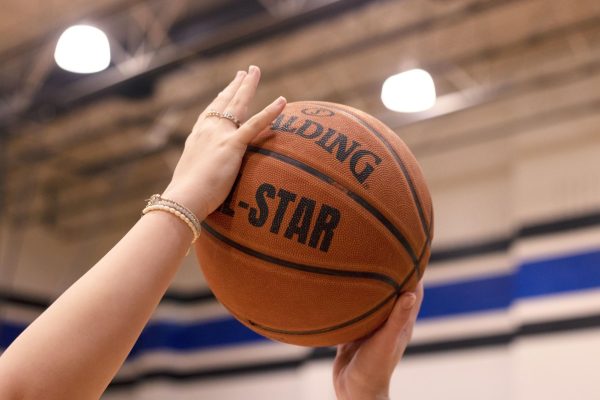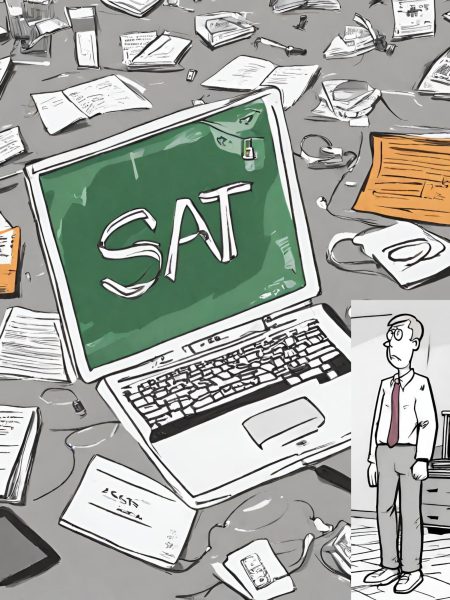#spreadtheword “Inclusion” not so effective for this atypical student
Alexis Simmerman has a number of stress toys and objects, including a pair of earmuffs, a ball of magnetic studs, two rubix cubes (one pyramid shaped) a necklace, a goo toy, a fuzzy ball, and a broken watch.
March 25, 2021
FCPS has been highlighting inclusion, culminating recently in #speadtheword Inclusion awareness day on March 3.
This includes a pledge to show that we as a school are inclusive and united. Specifically, it encourages students to “Be a teammate. Be a friend. Welcome someone who has been left out. Sit next to someone alone at lunch. Say hello to someone in the hallway. There are so many ways to spread inclusion. Choose yours.”
Normally I would generally just take the pledge and not think much of it.
However, this particular topic is one that hits pretty close to home for me. I think it’s time I finally rip off the tape and start talking.
It’s sad schools give only a day or two to focus on inclusion when I’ve been excluded my whole life.
Although there are some groups I can always trust to include me no matter what. I owe my life to my family for being supportive of me for all my life, and giving me both the discipline and the skills I needed to make it this far, as well as their ever-lasting support and love despite my flaws.
The teachers in FCPS are also amazing, and I can confidently say that I am grateful to them for everything they have done for me, and putting up with my idiosyncrasies.
The school faculty are also amazing for giving me the ability to make accommodations for my issues, and being understanding of my needs. The middle school counselors are absolute saints for allowing me to check in with them everyday, and I can’t remember a single bad faculty member who was ever rude or unsupportive.
My peers? Not so much. I have been with the FCPS school system for my whole life, and while the faculty have always been amazing for me, the students have always been a different story.
What is Autism?
I have autism, which is characterized by the Centers for Disease Control and Prevention as “Autism spectrum disorder (ASD) is a developmental disability that can cause significant social, communication and behavioral challenges.” More accurately, I have Asperger’s Syndrome. I have trouble with social interactions. I hate eye contact. I’m not in tune with jokes or sarcasm. I have narrow interests and obsessions, and I like to collect things.
That’s not a full list, but you get the idea. The thing is, when someone first approaches me, they might not even expect that I even have a condition, because it might just seem like I’m a normal person who just acts a bit odd.
Nothing about this really bothers me. It’s just the way I was born, and I can’t exactly change that. And even if I could change, I’ve lived with these conditions for my entire life. They’ve become a part of the way I perceive the world, the way I make decisions. To take that away, that would be like trying to erase a large part of myself that would end up erasing who I am as a person.
There are many things I would love to erase about myself. Small imperfections, insecurities, flaws, loose threads of myself. But to pull at those threads, to try to erase those imperfections, and I would unravel the tapestry of my life.
Autism’s effect on my childhood
I was diagnosed with my conditions early, probably earlier than a lot of other people. Then again, my six -year-old self made it pretty obvious that something wasn’t right when I just wandered off to read during a lecture. I was too young to fully understand what was going on at the time. How would you explain this to a six year old? I had a few clues such as doctors visits, therapy, and medicine. I trusted my parents to do what was best for me, and I was too young to really start questioning.
I was actually relatively unaffected by these conditions in my earliest school years. Making friends is easier for small children because they are so unsuspecting and innocent. At times, I wish I could go back to those days, back to when I wasn’t alone. I actually had a couple of friends, and I was generally talkative with people. I wasn’t popular, but I certainly wasn’t where I am now. I don’t think I was even afraid to approach anyone back then.
Then the changes started coming. I started to notice how painful just being in the cafeteria during lunchtime was. Suddenly, the loud volume of the room became too much. I found out later on in life that this was a sensory overload. People with autism are more sensitive to stimuli, and given too much, or even just a little bit of these certain stimuli at once can cause us to become anxious, uncomfortable, emotional, or even in pain. It varies from person to person.
The lunch room noise is the worst.
I started holding my hands over my ears during lunch, just to have some hope of blocking out the noise. I went hungry, but it was better than being in pain. Even just noise in the classroom was too much for me.
Also, I could get easily aggravated when people talked during classes, even snapping at others to “be quiet.” This wasn’t just an overreaction, because for me this over stimulation could have very serious consequences.
Most of the time, I would get a huge headache. It didn’t help that I was unable to swallow pills at that time, no matter how much my mom tried to train me to do so. And that was if I was lucky. Nausea accompanied the headaches on the unlucky days. It was pretty clear that something had to change.
The solution was a pair of earmuffs during school, just to block out the noise a bit. I’ve fluctuated between models of earmuffs over the years, but I think that most people are pretty familiar with my current go-to model. I understand that maybe the earmuffs don’t completely help, but just the thought of having some sort of protection is enough to calm me, and lessen the sensory input so I don’t double over in pain. I can’t go for very long in school without my earmuffs, and holding my hands over my ears in the same way my current earmuffs cover my ears is one of my default comfort positions.
Another solution was to move to a separate table on the side of the cafeteria to lessen my noise exposure. It was seemingly a lonely idea, but my friends all assured me that they would come and visit me at my table from time to time to keep me company, and anything was better than the cafeteria, so I agreed.
People did come to visit, at first, until they didn’t.
The sudden disappearance of inclusion
The drifting away of former friends was slow, over time, and I didn’t think much of it at first. The visits to my separate table became weekly, then once every few weeks, monthly, once every few months, until it became years apart that I would actually have someone visit me at my table. I can’t remember the last time someone came to sit with me.
It starts, with the unexpected loss, of something dear. The warmth, that comforted and cradled, just disappears. And in it’s place there’s nothing, just an endless empty hole. The light that showed the way is gone, and darkness takes control. Bitterness and anger, are quick to fill the void. The path to isolation, is littered with the dreams that lay destroyed.
— Jeff William, Path to Isolation
That’s what I mean by inclusion. The pledge means get up from your friends and sit with me from time to time–it’s not easy because peer pressure tells you to stay where you are.
I have also been bullied in the past. To be honest, I don’t remember all that much about the incidents. However, I guess I am a lot luckier than some other people who have been bullied. There was never anything too serious such as physical aggression, and the issues were resolved pretty quickly because I tend to get close to my teachers for such a reason. There are benefits to being the “good kid.”
However, I do believe that these incidents were one of the main reasons I started to close off. My mind just naturally took defensive measures and made sure that the chances for being hurt like that again were minimized. Still, there is one thing that even to this day, I will never understand. I don’t even know how either of the bullying situations started. I was just trying to be nice to both of the people who bullied me, and I don’t think I did anything too outwardly hurt them. I was trying to be their friend.
Of course, my interests probably don’t help my social situation. I like fantasy novels and stories. Most of what I like to do stems from this.
Even when I was young, I loved to create stories and act them out. This is what I did before the internet came into my life, and it’s still something I do even now. One day, I got the bright idea to actually write down one of my stories. From the moment I typed the first words onto that page, I fell down a rabbit hole that I didn’t even know existed. I loved to write down every single story that came into my head, and on that computer, I felt free to write whatever I wanted without anyone judging me.
When I first got a Chromebook, you can imagine what happened next. I began writing non-stop, constantly thinking of new characters, worlds, and problems to write down, and they only got bigger as I kept going. As I got older, I started to learn how to write about more complex problems, more complex worlds, more complex characters, and I even started to research mental illnesses that I could apply to my characters. My Chromebook became a safe place for me–a place where I could express myself freely, and I didn’t have to worry about being judged.
Then came the double disaster of middle school and teamwork. I can work peacefully with a group if I feel I am safe and I am being respected, but this experience made that a lot harder for me. I took woodworking which involves building, loud noises, teamwork: all the things I hate. I still have no idea why I chose the class. And these were middle schoolers, long before maturity began to set in.
At this point in time, I didn’t know how to advocate for myself in a positive manner.
In woodworking, the group assigned me to do all the paperwork for the assignment; they excluded me from the actual fun building, and they even went as far as to remove my access to the document we were supposed to be working on. I did the only thing I could think of: I started to badger them, hoping that somehow they would listen, but naturally, that didn’t work.
I can get stressed out much more easily if I feel things aren’t going smoothly or my teammates are talking excitedly without organization, and I’m much more prone to emotional outbursts in these states of high stress. It probably doesn’t help that I always have to be assigned to a group since no one ever outwardly says that they want to work with me.
What I’m trying to say here is that inclusion is hard. It means welcoming everyone to the group and giving each person the opportunity to shine. That rarely happens for me.
When I got into high school, I started to understand more about myself, but nothing really changed. I was still alone.
I deserve to be included
I’ve come to expect that people only talk to me because they need something from me such as school work. I do my best to achieve what they want, and navigate through the social interaction the best I can, and just expect them to drift away and never think of me again, just like everyone else. Even then, people have become so wild and chaotic to me that I’ve become genuinely terrified of approaching someone new, or even someone I recognize. I remember how people were to me in middle school, and I’ve drawn myself further into my shell, to protect myself and my own mental stability.
I honestly don’t think high schoolers are much more mature than those middle schoolers were. If we can’t learn to accept others for their differences, one they likely have no control over, then what is even the point of using the word maturity? Does that word even mean anything then? I’ve tried joining things like clubs, but at this point, I’ve given up. I don’t expect anyone to even bother to put in the time to make a lasting connection with me, so what’s the point of even trying to do the same with others? I never expect anyone to engage in anything more than small talk with me if I’m lucky enough to even get that, and most of my social interactions are limited to schoolwork.
It’s like being in quicksand: you want to get out, but moving could easily make your situation worse, and you have no idea where safety even is. All you can really do is scream for help, but I don’t expect anyone to hear me. It’s not like they heard all those years ago when it mattered.
There are many things I would love to erase about myself. Small imperfections, insecurities, flaws, loose threads of myself. But to pull at those threads, to try to erase those imperfections, and I would unravel the tapestry of my life.
— Alexis Simmerman
I have limitations, always have and always will. I have found ways to work around some of them, like with school work, but there are some hurdles that I just can’t climb on my own. I can’t change the way I was born. I can’t change the way my mind works, but I can learn to live with it, and try to live my best life.
And I’m not alone here. There are millions of people all over the world who struggle with similar problems. There are people who are differently abled, and I’m likely one of the luckier ones. People who are differently abled, mental or physically, are not mistakes. We experience happiness, sadness, anger just as much as anyone else. We have hopes, dreams, ambitions, goals, and interests just like everyone else.
We are not machines. We aren’t emotionless or don’t want social interaction, we just don’t know how to do that. We are human beings, and we have a right to be included among others, despite our flaws.
Would it really have been so hard for someone to stick around during those lunches? That’s inclusion.
Would it really have been so hard for someone to try to understand my interests, even if I do ramble? That’s inclusion.
Would it really have been so hard for someone to do their best to actually make me feel welcome during group projects, and not a liability? That’s inclusion.
Inclusion shouldn’t just be a pledge you make, it should be an action.
It should be including people of all races, size, gender, and mental states, no matter what. It shouldn’t be an obligation, it should be a choice, a choice one makes out of the goodness in their heart and nothing more.
This story was originally published on The Lance on March 22, 2021.



























![IN THE SPOTLIGHT: Junior Zalie Mann performs “I Love to Cry at Weddings,” an ensemble piece from the fall musical Sweet Charity, to prospective students during the Fine Arts Showcase on Wednesday, Nov. 8. The showcase is a compilation of performances and demonstrations from each fine arts strand offered at McCallum. This show is put on so that prospective students can see if they are interested in joining an academy or major.
Sweet Charity originally ran the weekends of Sept. 28 and Oct. 8, but made a comeback for the Fine Arts Showcase.
“[Being at the front in the spotlight] is my favorite part of the whole dance, so I was super happy to be on stage performing and smiling at the audience,” Mann said.
Mann performed in both the musical theatre performance and dance excerpt “Ethereal,” a contemporary piece choreographed by the new dance director Terrance Carson, in the showcase. With also being a dance ambassador, Mann got to talk about what MAC dance is, her experience and answer any questions the aspiring arts majors and their parents may have.
Caption by Maya Tackett.](https://bestofsno.com/wp-content/uploads/2024/02/53321803427_47cd17fe70_o-1-1200x800.jpg)
![SPREADING THE JOY: Sophomore Chim Becker poses with sophomores Cozbi Sims and Lou Davidson while manning a table at the Hispanic Heritage treat day during lunch of Sept 28. Becker is a part of the students of color alliance, who put together the activity to raise money for their club.
“It [the stand] was really fun because McCallum has a lot of latino kids,” Becker said. “And I think it was nice that I could share the stuff that I usually just have at home with people who have never tried it before.”
Becker recognizes the importance of celebrating Hispanic heritage at Mac.
“I think its important to celebrate,” Becker said. “Because our culture is awesome and super cool, and everybody should be able to learn about other cultures of the world.”
Caption by JoJo Barnard.](https://bestofsno.com/wp-content/uploads/2024/01/53221601352_4127a81c41_o-1200x675.jpg)




